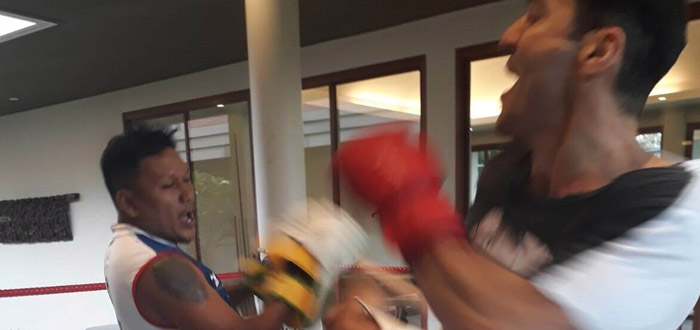

Written by Rami Cassis
31 Mar
Rami Cassis is a competitive kickboxer taking part in both open competitions and full-contact tournaments. He has fought in 6 competitive bouts (4W,1D,1L).
Here, Rami sets out why he started kickboxing, how he approaches fights and what the sport means to him in relation to his personal and professional life.
I’ve had a decades-long relationship with kickboxing and combat sports, going right back to my teenage years at school in Sydney.
I was born in Egypt but my parents migrated to France when I was three. We then moved to Sydney when I was 13, and I used to get into school playground fights on a regular basis.
I was an aggressive skinny French kid who didn’t take any nonsense, and not speaking English at a school in Australia in the 1970s meant I stood out.
Being a bit different at school meant attracting lots of unwanted attention, which got me into numerous fights.
These got fewer and fewer over time, as people started to realise I wasn’t going to take any s***.
I quickly realised fighting was something I enjoyed and I naturally tended to be drawn to confrontation. It was more brawls than anything well executed, and I hadn’t learnt any combat sport techniques at the time, but I had heart.
My first real experience was a few years later at university, also in Sydney, when I started kung-fu and a bit of kickboxing.
Nothing further happened after university as I began to work at Schlumberger and I was moving around the world extensively. I was in the Australian desert for three years, the jungle of Borneo for two-and-a-half years and the Congo for three years. Starting life as an engineer on oil rigs when working in harsh or remote locations means there’s little time for anything else, so the only training I did for many years was weights.
It was much later, in my mid-30s when I first came to the UK, that I picked up kickboxing again. I started training in Bristol, where I was initially working, and joined a kickboxing and martial arts club in Weston-super-Mare. It only took me a year to get to a half-decent level, mainly because of my past and because I applied myself in the training classes.
I already knew I could take a punch and wasn’t afraid of confrontation, so the idea of getting hit never bothered me – in fact it was almost the opposite.
My kung-fu experience taught me speed, flexibility and how to watch your opponent – skills essential in any combat sports. It’s also often the case that the more types of martial arts you learn, the better you become at picking up others, and ultimately almost create your own style.
I befriended the club owner and quite a few of the fighters, and had my first encounter with organised bouts at an inter-club tournament. I did reasonably well and they asked me if I wanted to fight in so-called full contact bouts.
My first competitive fight was in Weston-super-Mare, in front of about 1,000 people. It was a Saturday night fight card of a dozen bouts and a small purse – but it was never about the money.
The feeling beforehand? I was nervous as hell. Stepping in the ring in general takes a bit of courage. Obviously that’s not to the same extent as the pros, but it’s still not easy at that level.
But when the bell went, I reverted to my usual style of up close and personal, and won on points – it was three two-minute rounds of full-contact kickboxing rules. Going to sleep that night was impossible.
Overall, I have a modest competitive record of six fights: four wins, one draw and one loss. My style, as it was in all of the bouts, is pretty one-dimensional and is about putting the opponent under pressure. My cardio can’t always keep up, nor can my defence, although I think both have improved since!
I’m a fighter rather than a boxer, which means I’ll get killed if I step in the ring with a real boxer.
Over the years, I have tended to favour weight training over cardio, which is no doubt a mistake. If there’s one thing I’ve done consistently, it’s weights with occasional running, and I wish it had been the other way round.
Still, I’m quite strong for my weight and have tended to be stronger than my opponent for my weight category. My cardio, guard and movement around the ring are the areas I need to work on.
In order to be a really good pressure fighter, you’ve got to have big lungs and I’ve learned it’s important to use different kinds of styles rather than always the same approach. So if I get back into the ring again, I’ve got to try and be a little bit wiser in terms of my ring savviness.
I haven’t fought since 2015, when life took over once again with both professional and personal commitments, the most important of which is my daughter Laetitia.
Still, I’ve consistently managed to keep training. I do three to five sessions every week and manage to stay in good enough shape so that I’m never more than two months away from being fight ready.
I also spar regularly and I am still considering going back into competitive or semi-competitive fighting.
I think everyone has a sport they like, that they feel close to, and in some way matches their personality. Enjoying a combat sport does not make me confrontational in the real world but it’s a fantastic release which forces you to focus on the moment. There are lots of ways to de-stress but I neither drink nor smoke, and have always found sports to be the ultimate way to not only clear your head, but also maintain a strong work/training ethic and resilience.